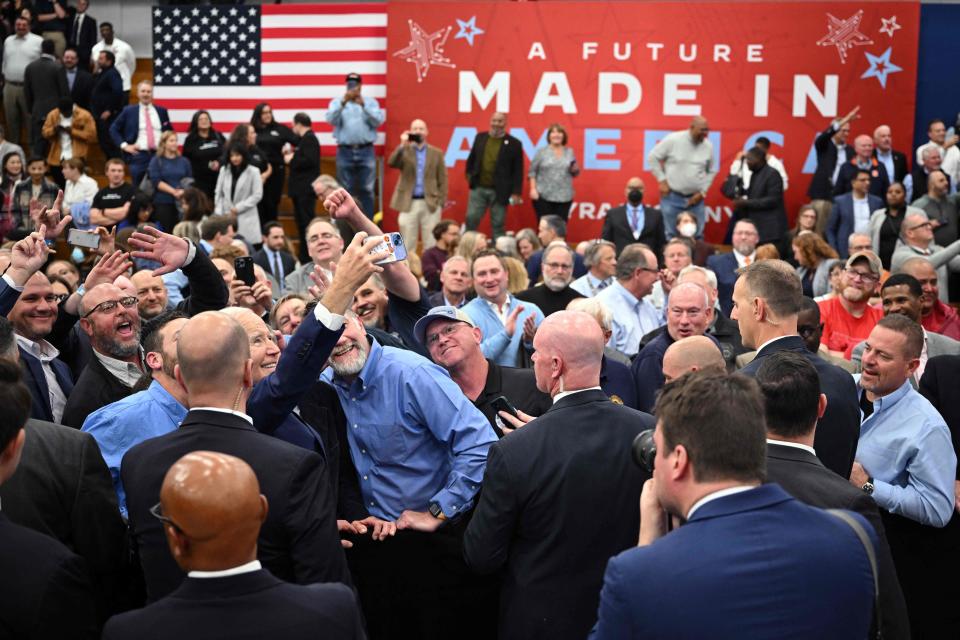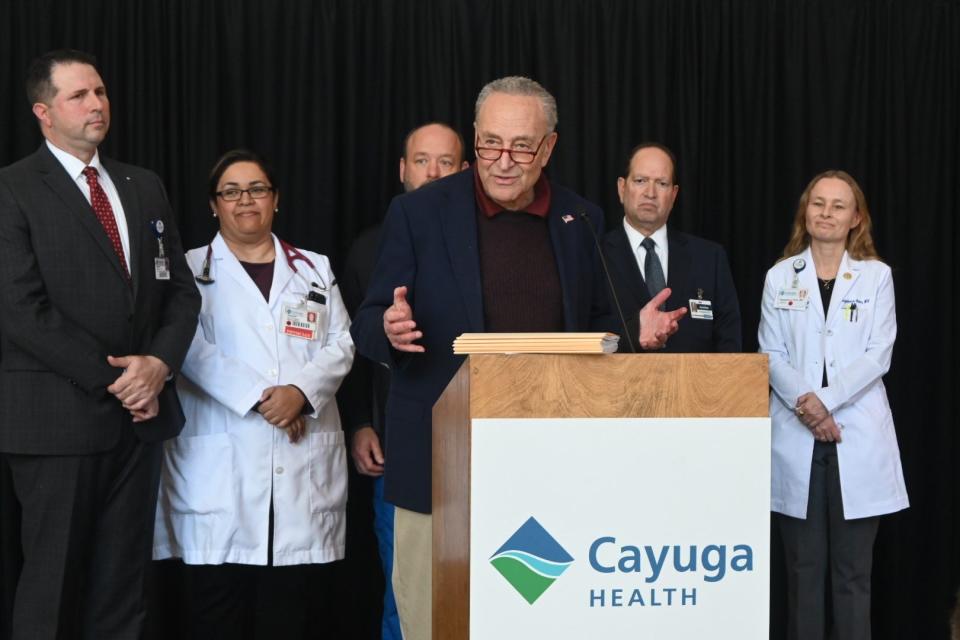Tech Hub slated for Rochester, upstate NY cities needs workforce. Can local colleges step up?
- Oops!Something went wrong.Please try again later.
Monroe Community College is seeking $17.5 million to lead the effort to train thousands of workers in upstate New York’s three biggest cities for jobs in the semiconductor industry, according to a proposal submitted last week.
The funding would support MCC’s collaboration with colleges and training centers in developing a workforce in Buffalo, Syracuse, and Rochester to support tech giant Micron’s $100 billion investment in Onondaga County.
Some 5,000 mid-level positions and another 4,000 construction jobs in the semiconductor supply chain are envisioned, with a focus on hiring women and workers from ethnic and racial minorities.
The $17.5 million represents nearly a third of the $54 million a consortium representing the three cities — known as NY SMART I-Corridor Tech Hub — is seeking after beating out hundreds of competitors in October to be selected one of the nation’s 31 Tech Hubs.
In addition to MCC, Syracuse University would receive $15 million for an innovation initiative geared to harnessing the region’s academic research and development efforts. And the University of Buffalo would receive $8 million to assist local manufacturers as they pivot to work in the semiconductor supply chain.
The funding wish list was sent to the U.S. Department of Economic Development last week by NY SMART I-Corridor Tech Hub.

What are the region's chances for even more money?
October’s Tech Hub designation did not come with a funding guarantee.
In the competition’s second round, the region is contending with other tech hubs, including one from Binghamton, for a piece of roughly $500 million allotted for the program’s debut year. Between five and ten tech hubs will receive up to $75 million apiece.
Competition: Rochester, Buffalo, Syracuse make cut in first round of high-dollar Tech Hub sweepstakes
U.S. Sen. Charles Schumer, who co-authored the CHIPs and Science Act legislation that created the tech hubs, has been lobbying federal officials in support of the upstate bid.
“I’m very optimistic we’re going to get it,” Schumer said.

Coupled with Micron’s promise of nearly 50,000 jobs at a chip manufacturing plant near Syracuse, the job gains alone have the potential to transform vast swaths of the upstate economy.
“It will mean that parents and grandparents will no longer worry about their kids moving away to find a good-paying job in the future,” Schumer added. “They’ll be able to stay right here in upstate New York. I remember Kodak and Carrier and so many of the auto companies. Giants. They all closed and left and shrunk. But now we have a golden opportunity for upstate.”
Supporters say over the next ten years, one of every four U.S.-made semiconductor chips could be produced within 350 miles of the I-90 corridor, part of a national effort to wrest away China’s manufacturing dominance in the industry.
Momentum has picked up in recent months with the announcement of Edwards Vacuum’s plans to invest $300 million at a dry pump manufacturing plant in Western New York to supply the semiconductor industry.
And in November, TTM Technologies announced it would invest $130 million in a manufacturing plant in Onondaga County to produce circuit boards used in microelectronics.
Finding the workers
The leadership of the three-city effort says there’s plenty of work ahead to ensure there are enough workers to fill jobs.
“I think everybody has to do a bunch of things in the workforce base to attract new workers and get existing workers off the sidelines, which we think we can do because we’ve started doing that successfully on other projects,” said Benjamin Sio, a vice president with CenterState, which is leading the Syracuse part of the consortium. “And then generate the talent.”
Other companies looking to build upstate have faced similar challenges in recent months.
Li-Cycle: 'A big speed bump.' Li-Cycle CEO opens up about setbacks in Rochester facility
In November, the chief executive officer of Li-Cycle, which recycles metals for use in electric vehicle batteries, said the company’s decision to pause construction at the Eastman Business Park was due in part to a shortage of available construction workers in the region.
Sio said the upstate region has an advantage tech hubs in Texas, Ohio, Arizona and others don’t — proximity to dozens of colleges and top-flight universities. In Central New York alone there are nearly 40 colleges and universities within a two-to-three-hour drive.
Colleges: RIT part of U.S.-Japan semiconductor development program
“Even your Austins, your Columbuses of the world don’t have the size and scale and ability to significantly produce talent like we do in upstate New York,” Sio said.

MCC will work with other community colleges to develop mid-level workers for jobs in the semiconductor industry through training programs that are more hands-on than academic.
The college, with campuses in Rochester and Brighton, is already working with other schools on similar initiatives.
“This is an opportunity to leverage those relationships,” said Joseph Stefko, the CEO of ROC2025, which is leading Rochester’s efforts in the consortium.
This article originally appeared on Rochester Democrat and Chronicle: NY Tech Hub needs workforce to fill 9K jobs. Can colleges deliver?

